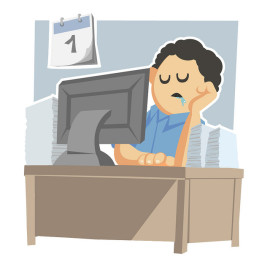We’ve got a national sleep deficit and the deprivation isn’t good for anybody. NPR ran an article in August covering a new policy statement from the American Academy of Pediatrics regarding teens and sleep habits. The new policy states that teens require eight to ten hours of sleep but, due to early start times at school, are averaging only six to seven. Teens, according to the Academy, have a biological rhythm that shifts to a later time-frame when they enter adolescence. As a result, it is essentially impossible for them to fall asleep at an hour that would allow for the required amount of sleep given the early start times of most schools. In light of this fact, the AAP calls on school districts to move start times back. This is fraught with controversy. I can remember the debate in my own school district. However, with the AAP’s new policy, it has now become a public health debate and as a personal trainer, I can say it is one we need to have across all ages.
Sleep deprivation has been an important subject for me working as a personal trainer with the adult population in New York City. Sleep is an integral part of fitness, necessary for both optimal performance and optimal recovery. Not only is it important for getting through a workout, but once the workout is complete, failure to get enough shut eye can slow recovery and negatively impact results. Furthermore, recent studies have suggested a potential link between poor sleep patterns and weight gain. A tired adult is more likely to consume extra calories through coffee and afternoon sweets. More alarmingly, their bodies’ may react to the stress hormonally. These stress hormones may cause more over-eating, or potentially worse, a generalized increase in fat storage, especially around the mid-section. More and more, the evidence is pointing in one direction – a lack of sleep is bad!
Given the potential health impacts, finding ways to give teens more sleep ought to be a no-brainer. Unfortunately, such a change would create quite a few logistical challenges. Organizing busing becomes a problem, after school activities have to be shifted, older siblings may not return home before younger ones, and so on. As a result, many efforts to change school starting times die a quick death in open debate. We just don’t have the will to deal with such a massive reworking of our schedules.
This to me, is a very unfortunate act of collective denial. I like to compare it to excuses around poor eating habits. Clients who have eaten or drunk something that they know they should not almost always have an excuse. Perhaps it was a birthday, or a dinner party, or a vacation, or some other circumstance which made it impossible for them to say no to whatever it was that they indulged in. My response is always the same. It’s ok that once in a while societal norms and/or simply enjoying life makes it necessary to indulge in something that we know from a health standpoint we should not. However, this does not absolve us from bearing the consequences. The body does not care why you ate that sugar bomb or had another glass of wine, it just does with it what it does (namely deposit it on our ‘problem areas’). It doesn’t make us bad people for making the choice, it simply means we have to contend with the results.
The sleep problem unfolds the same way. Adult life in our society can be very complicated. There is a lot of pressure to be a star at work, to go the extra mile and get ahead, while at the same time maintaining a personal life with family and friends. Especially in New York City, where I work, the expectations of this lifestyle make it almost impossible to get enough sleep, and many people don’t. Once again though, the reality is that the body has no interest in why we are not getting enough sleep, it simply reacts, and negatively.
Ultimately, if we as a society are serious about tackling our growing health issues, we are going to have to have some honest conversations about the fact that we make choices that come with consequences whether we want them or not. There are many reasons why changing school times to allow teens more sleep, or changing attitudes about work and life for adults would be very difficult. I don’t have a direct answer to either of those problems. But, if we choose not to change things for whatever reasons, we must also openly accept the consequences. Early start times will cause sleep deprivation in the teenage population, and this will hurt our children’s health. Sleep deprivation in adults will hurt theirs. Are we ok with that, or are we not?
http://www.mayoclinic.org/healthy-living/adult-health/expert-answers/sleep-and-weight-gain/faq-20058198
PHOTO: amenclinicsphotos ac – Asleep At The Desk, License

Pingback: Beet Juice Benefits? - do the movementdo the movement January 25, 2015
[…] The National Sleep Deficit […]